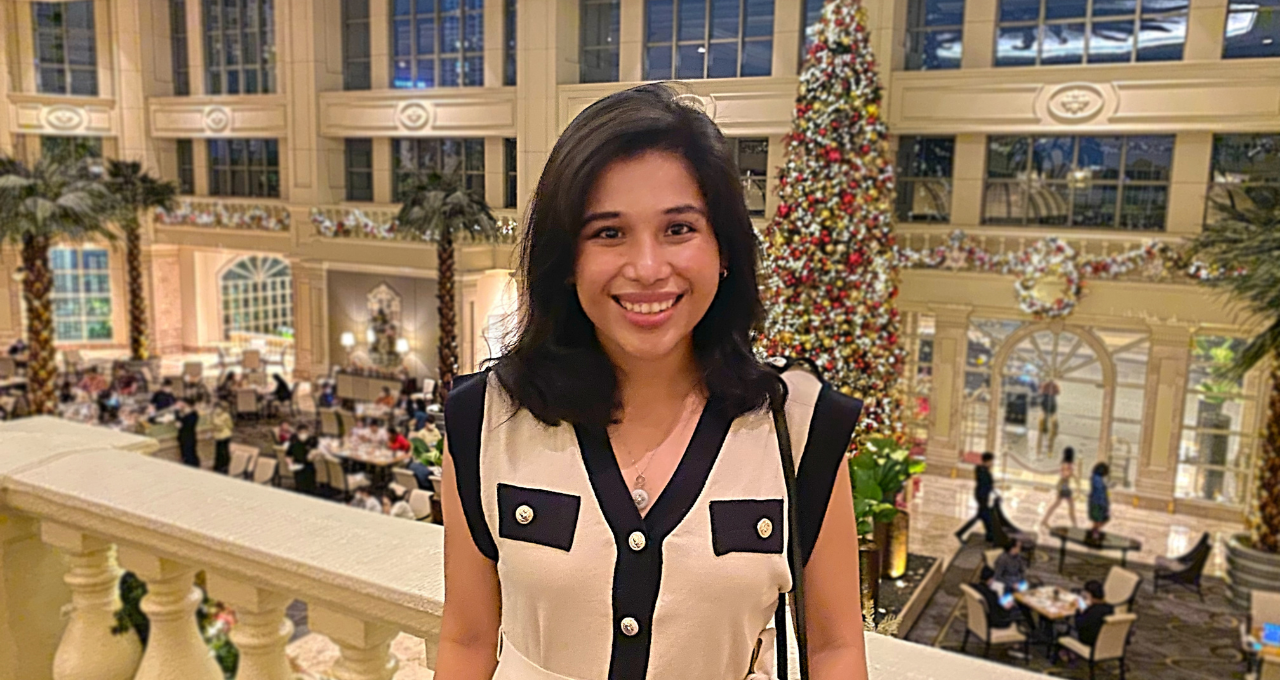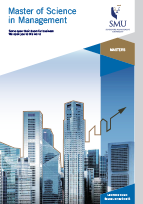
Who hasn't been asked, "what do you want to be when you grow up?" We all have a dream and sometimes, some of us know exactly where it is we need to be and what to do to get there. Others may not know at first, but with guidance from people we meet throughout this labyrinth called life, we gain greater clarity in identifying and setting personal goalposts.
SMU Master of Science in Management (MiM) student Maria Luiza Ramiento is an amalgamation of both. Having started her career in human resources—spending a little over two years nurturing her knowledge, skills, and expertise, Maria experienced first-hand the power of people-centric innovation: the projects that were the most successful were the ones that prioritised users' concerns and placed them at the heart of any product or solution. Unfortunately, organisations can occasionally be caught up in achieving technical expertise, and at the expense of the needs of people who matter most: customers.
“I remember one of the leaders I worked with telling me that it is worthwhile to start your career working on the frontline operations, because only then can you truly understand your customers,” says Luiza, who is currently a Project Manager and Business Analyst at multinational software company SAP and aims to move into strategic consulting.
"In retrospect, spending my earlier years in HR operations has paid off. I am constantly reminded that any innovation or automation project, especially in areas where people are highly involved, should serve the true needs of its users or customers.”
Armed with a strong sense of purpose in optimising customer experience (CX), Maria had a specific idea of what she was looking for when it came to deciding on the right master’s programme. For example, she was drawn to SMU due to the degree of flexibility offered in the blended MiM programme. The blended learning format allows her to fulfil her work responsibilities, while ensuring she is in control of her career development.
And while her experience in project management, innovation and CX is a strong start, Maria discovered that the master’s programme would provide her with a competitive edge in her career. Not only does the MiM programme offer a professional and comprehensive curriculum that covers current trends in business management, but it is also combined with practical learning. The programme provides the chance to build networks and lay the foundation for an accelerated career path ahead through internships, case studies and hands-on learning experiences, as well as connects students with the business community in the region.
“When I was looking for the right university, SMU wasn’t just another educational institution that popped up randomly from a Google search,” says Maria.
“I intentionally researched the programmes that best fit my plans and goals and learned that the MiM programme will analyse trends that affect businesses and organisations – and it has certainly delivered. I pay special attention every time topics such as sustainability, Industry 4.0 and the like are discussed in class as these trending topics interest me, and I am excited to learn how such developments affect and shape other industries.”
The unique programme also sheds light on ways to thrive when doing business in Asia, by combining business expertise with Asian economic and cultural insights. SMU’s international faculty and student body play a major role in contributing to a deep understanding of the region’s polity and society, to develop the right mindset for being part of Asian growth—with an emphasis on the application of theory to practice.
After all, Maria believes that “we are the sum of the people around us,” and credits the opportunities to interact with peers from various backgrounds, industries, and experiences for enabling her to step out of an “echo chamber”. This ability to learn from a richly diverse community is an extension of Maria’s role as a passionate advocate of inclusivity and diversity in workplaces.
“Diversity is a fact,” remarks Maria, who also shares that SAP promotes a culture that champions inclusivity.
“If we hire and promote based on skills, credentials, or experience, the results will be diverse. However, we must first recognise structural disadvantages and actively eliminate them.”
Today, besides prioritising customer needs and supervising global workgroups to ensure strategic partnership and collaboration, Maria is also the co-founder and customer manager of a disaster relief collaboration platform developed by SAP. Named 4W-Wizard, the app utilises machine learning to significantly reduce the amount of time the UN Office for the Coordination of Humanitarian Affairs (OCHA) takes to coordinate disaster relief efforts. In part borne from Maria’s personal experiences as a citizen of the natural disaster-prone nation, the Philippines, the app helps develop solutions and provide real-time insights, thereby fostering collaboration for humanitarian relief.
“When we spoke with NGOs and government agencies, they agreed that they could make better decisions in disaster management if collaboration points were visible,” says Maria.
“I thought, if we can use the same technology used to make businesses more profitable and efficient, why not make use of the same resources to address societal problems directly?”
In more ways than one, the MiM programme helped Maria apply the concepts taught in class to not only achieve success in a changing business world, but also to help make the world a better place. The course challenges her to think about how businesses evolve and what comes next in real-life case studies.
“One of the challenges I face is the translation of strategy into day-to-day operations,” says Maria.
“We don’t want the strategy to be mere fluff but to produce key, actionable results. The MiM programme offers thought leadership whereby concepts are not taught in isolation. They are applied in case studies and real-life business scenarios. We are challenged to think about what’s next, how are businesses evolving? This encourages me to look at my organisation’s strategy from a more progressive angle.”
Speak to our Admissions Advisors
Lee Kong Chian School of Business
Postgraduate Admissions
Graduate Programmes Office
50 Stamford Rd, Singapore 178899
Tel: +65 6828 0882
Join us at the upcoming events
Ofukacho, 1−1 ヨドバシ梅田タワ
Osaka, Kita Ward, 〒530-0011, Japan
Kyobashi, 1 Chome−3−5 三井ガーデンホテル 1F
Chuo City, Tokyo, 〒104-0031, Japan
